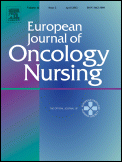
European Journal of Oncology Nursing
Scope & Guideline
Fostering Excellence: The Premier Journal for Oncology Nursing
Introduction
Aims and Scopes
- Patient-Centered Care:
Research emphasizing the importance of understanding patients' experiences, needs, and preferences in oncology nursing, aiming to improve care delivery and patient satisfaction. - Symptom Management:
Studies focused on the assessment and management of symptoms experienced by cancer patients, including pain, fatigue, and psychological distress, to enhance their quality of life. - Psychosocial Support:
Exploration of the psychological and social factors affecting cancer patients and their families, including resilience, coping strategies, and the impact of caregiving. - Interventions and Innovations:
Research on innovative nursing interventions, including digital health tools, exercise programs, and educational strategies, aimed at improving patient outcomes. - Health Equity and Access:
Investigations into disparities in cancer care, focusing on socioeconomic, cultural, and geographic factors that influence access to treatment and support. - Professional Development:
Studies aimed at enhancing the competencies and well-being of oncology nursing professionals, including training, education, and workplace dynamics.
Trending and Emerging
- Digital Health and Telehealth Innovations:
An increasing number of studies are focusing on the use of digital tools and telehealth to enhance patient engagement, self-management, and access to care, particularly in the context of the COVID-19 pandemic. - Holistic and Integrative Approaches:
There is a trend towards exploring integrative care models that combine traditional nursing practices with complementary therapies, addressing the physical, emotional, and spiritual needs of patients. - Caregiver Support and Family Dynamics:
Research is increasingly recognizing the role of family caregivers and the impact of cancer on family dynamics, leading to studies focused on support interventions for caregivers. - Health Equity and Cultural Competence:
Emerging themes highlight the importance of addressing health disparities and ensuring culturally competent care for diverse patient populations. - Psychological Resilience and Coping Strategies:
A growing body of research is examining the factors that contribute to psychological resilience among cancer patients, emphasizing the importance of coping strategies in treatment outcomes.
Declining or Waning
- Traditional Treatment Modalities:
Research focusing on conventional cancer treatments without integrating complementary or supportive care perspectives has decreased, as there is a growing recognition of holistic approaches. - Basic Clinical Trials:
Studies that primarily report clinical trial results without a nursing or patient-centered focus are becoming less prominent, as there is a shift towards research that emphasizes the role of nursing in the clinical trial process. - Generic Quality of Life Assessments:
While quality of life remains a key area of research, there is a decline in studies utilizing generic assessments without tailoring them to specific cancer types or patient demographics. - Single-Disease Focus:
Research concentrating solely on one type of cancer is waning in favor of studies that address comorbidities and the experiences of patients with multiple cancer types or chronic conditions. - Pharmacological Interventions:
There is a noticeable decrease in studies focused exclusively on pharmacological interventions, with a greater emphasis now on non-pharmacological strategies and holistic care approaches.
Similar Journals
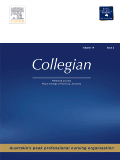
Collegian
Advancing Nursing Knowledge, One Article at a Time.Collegian is a distinguished academic journal published by Elsevier, focusing on the dynamic field of nursing. Launched in 1994 and continuing through to 2024, it aims to contribute to the advancement of nursing knowledge and practice. With an ISSN of 1322-7696 and an E-ISSN of 1876-7575, this journal has achieved an impressive standing, securing a Q2 category ranking within Nursing (miscellaneous) and positioning itself at #49/139 in the general nursing category on Scopus, with a commendable 65th percentile. The journal provides a platform for both established researchers and emerging scholars to share innovative research, case studies, and reviews that shape nursing education and practice. Although not open access, it remains widely recognized for its rigorous peer-review process and substantial contributions to nursing literature. As the profession evolves, Collegian stands out as a pivotal resource for professionals, educators, and students who seek to enhance their understanding and application of nursing science.
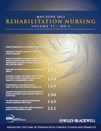
Rehabilitation Nursing
Advancing rehabilitation practices for better patient outcomes.Rehabilitation Nursing, published by Lippincott Williams & Wilkins, is an esteemed journal dedicated to advancing the fields of rehabilitation, nursing, and physical therapy. With an ISSN of 0278-4807 and an E-ISSN of 2048-7940, this journal has been a crucial resource for practitioners and researchers since its inception in 1975, continuously providing insights through its convergence of scholarship up to 2024. As a member of the Q3 category in multiple disciplines, including Medicine (Miscellaneous), Nursing (Miscellaneous), and Physical Therapy, the journal affirms its relevance within the academic community, particularly highlighted by its Scopus rankings. With a focus on disseminating innovative research, clinical findings, and evidence-based practices, Rehabilitation Nursing aims to enhance patient care and foster improvements in rehabilitation strategies. Whether one seeks to stay abreast of the latest developments or contribute new insights, this journal is a must-read for those involved in the fields of rehabilitation and nursing.
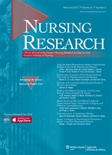
NURSING RESEARCH
Empowering nursing professionals with cutting-edge findings.Nursing Research, published by Lippincott Williams & Wilkins, is a prestigious academic journal dedicated to advancing the field of nursing through rigorous research and evidence-based practice. With an ISSN of 0029-6562 and an E-ISSN of 1538-9847, this journal has been a cornerstone of nursing scholarship since its inception in 1952. Currently ranked in the Q2 category for Medicine (miscellaneous) and in the Q1 category for Nursing (miscellaneous) as of 2023, Nursing Research is recognized for its high-quality contributions to the field and is ranked 38th out of 139 in General Nursing within Scopus. The journal offers essential insights and a forum for the latest research, enhancing clinical practices and informing policy decisions. Although it does not provide open access, it remains highly respected among researchers, professionals, and students alike, serving as an indispensable resource for those dedicated to improving patient care and advancing nursing science. For more information and to access articles, visit Nursing Research.
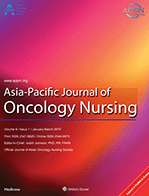
Asia-Pacific Journal of Oncology Nursing
Fostering Excellence in Oncology Nursing Research and PracticeAsia-Pacific Journal of Oncology Nursing, published by Elsevier Science Inc, serves as a vital resource for researchers, practitioners, and students involved in the fields of oncology and nursing within the Asia-Pacific region. Since its transition to Open Access in 2014, the journal has aimed to disseminate cutting-edge research and innovative practices that enhance the quality of nursing care in oncology. With its ISSN 2347-5625 and E-ISSN 2349-6673, this journal holds a Q3 rank in both Oncology and Nursing (Oncology Nursing) as of 2023, reflecting its commitment to addressing current challenges and advancements in the discipline. With a Scopus ranking of 252/404 in Medicine (Oncology) and 13/20 in Nursing (Oncology Nursing), it occupies a crucial position in the academic landscape, nurturing knowledge that directly impacts patient care in oncology settings. Located at STE 800, 230 Park Ave, New York, NY 10169, the journal encourages contributions that explore multifaceted aspects of oncology nursing from 2018 to 2024, making it an important platform for emerging voices and established experts alike.
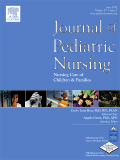
Journal of Pediatric Nursing-Nursing Care of Children & Families
Advancing pediatric care through innovative research.The Journal of Pediatric Nursing - Nursing Care of Children & Families, published by Elsevier Science Inc, is a leading academic journal that focuses on the essential practices and advancements in pediatric nursing. With an ISSN of 0882-5963, this prestigious journal has been at the forefront of pediatric healthcare literature since its inception in 1986, offering critical insights and research findings that address the needs of children and families. Recognized in 2023 with a Q1 ranking in Pediatrics and ranked 6th out of 25 in the Scopus Nursing and Pediatrics category, it reflects its significance and impact in these fields. The journal prioritizes high-quality research that enhances nursing care practices, advocates for child and family-centered approaches, and promotes evidence-based guidelines. While the journal currently does not have an open access model, it remains a vital resource for researchers, practitioners, and students dedicated to improving pediatric health outcomes. With a commitment to scholarly excellence, the Journal of Pediatric Nursing continues to contribute to the evolving landscape of nursing care for children globally.

Revista Rol de Enfermeria
Elevating Nursing Knowledge for a Healthier TomorrowRevista Rol de Enfermeria, published by EDICIONES ROL S L, is a distinguished peer-reviewed journal that has been a cornerstone of nursing knowledge and practice since its inception in 1980. With a specific focus on the field of nursing and healthcare, this journal serves as a vital platform for researchers, clinicians, and educators to disseminate their findings, enhance professional practices, and support the development of evidence-based nursing care. Although its coverage in Scopus has been discontinued as of 2016, the journal has maintained an essential role in the nursing community, contributing to the advancement of general medicine as evidenced by its ranking in Scopus at #679 out of 862, placing it within the 21st percentile. While Revista Rol de Enfermeria does not currently offer an open access model, its historical significance and thematic relevance make it a valuable resource for professionals seeking to stay informed about the latest developments in nursing research and education. Situated in Barcelona, Spain, it continues to reflect the dynamic evolution of nursing practice across diverse healthcare landscapes.
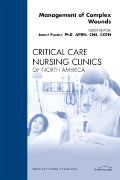
Critical Care Nursing Clinics of North America
Elevating Standards in Critical Care Nursing.Critical Care Nursing Clinics of North America, published by W B Saunders Co-Elsevier Inc, stands as a leading journal in the field of critical care nursing, showcasing groundbreaking research and essential clinical practices since its inception in 1989. With an ISSN of 0899-5885 and an E-ISSN of 1558-3481, this quarterly publication has earned its reputation within the Q2 category of critical care nursing, ranking 13th out of 27 in the Scopus metrics. Its contributions significantly aid healthcare professionals in enhancing patient outcomes in critical settings through the dissemination of evidence-based knowledge, innovative approaches, and expert insights. Although it does not offer an Open Access model, the journal remains dedicated to serving researchers, practitioners, and students in understanding advancements and best practices within this dynamic specialty, with a focus on improving the quality of care in critical nursing environments.
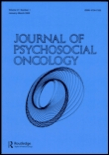
JOURNAL OF PSYCHOSOCIAL ONCOLOGY
Illuminating the psychosocial journey of cancer patients.JOURNAL OF PSYCHOSOCIAL ONCOLOGY, published by Routledge Journals, Taylor & Francis Ltd, serves as a pivotal platform in the interdisciplinary field of psychosocial oncology, providing critical insights into the psychological, social, and emotional aspects impacting cancer patients and their families. With a storied history dating back to 1983 and converging until 2024, this journal holds a prestigious positioning, ranked in the Q2 category for Applied Psychology and Q3 for both Oncology and Psychiatry & Mental Health in 2023, highlighting its integral role in these overlapping fields. Despite not currently offering an open access model, the journal continues to attract a broad spectrum of scholars with its impactful research, evidenced by its Scopus rankings within the 50th to 58th percentile across related categories. Researchers, clinicians, and students alike will find the journal’s focus on the psychosocial dimensions of cancer to be invaluable, as it advances knowledge and practice aimed at improving patient outcomes and well-being in the cancer care continuum.
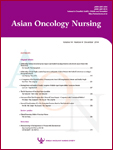
Asian Oncology Nursing
Connecting Professionals to Enhance Cancer Care ExcellenceAsian Oncology Nursing is a pivotal journal dedicated to advancing the field of oncology nursing across the Asian continent and beyond. Published by the esteemed Korean Oncology Nursing Society, this journal serves as a platform for researchers, clinicians, and educators to disseminate groundbreaking findings and innovative practices in cancer care and nursing. With an ISSN of 2287-2434 and E-ISSN 2093-7776, it is committed to enhancing the knowledge and skills of oncology nursing professionals, thereby improving patient outcomes. Although currently not operating as an open-access platform, the journal emphasizes the significance of bridging the research gap in oncology nursing, fostering collaboration among professionals in the field. Given the increasing importance of culturally competent care in oncology, Asian Oncology Nursing positions itself as an essential resource for those who strive to elevate standards of care and educate future generations of oncology nurses.

CANCER NURSING
Elevating patient care in oncology nursing since 1978.Cancer Nursing, a peer-reviewed journal published by Lippincott Williams & Wilkins, plays a pivotal role in the field of oncology nursing, providing a vital platform for the dissemination of research that enhances patient care and nursing practices related to cancer. With an impressive impact factor and categorized within the Q2 quartile for both oncology and nursing disciplines, this journal ranks among the top resources in its field, sitting at Rank #5 out of 20 in Nursing Oncology. Since its inception in 1978, the journal has continuously evolved to address critical issues in cancer treatment, patient education, and healthcare delivery, making it essential reading for researchers, practitioners, and students alike. Although it does not currently offer open access, the journal's commitment to advancing knowledge in oncology nursing is reflected in its rigorous selection process and the quality of its published research. As we look towards its upcoming issues in 2024, the journal remains a cornerstone for those dedicated to improving cancer care and the overall quality of life for patients and their families.